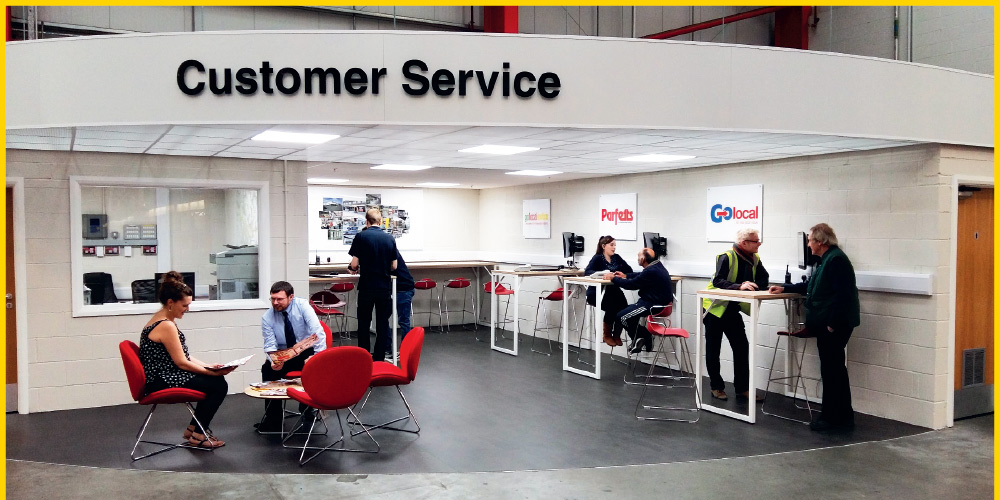Martyn Fisher finds out how much of a threat the retail ‘monster’ poses wholesale.
Amazon has defiantly parked its tanks on the lawn of the UK’s FMCG sector with its Fresh and Pantry divisions and its deals with premium high-street food retailer Whole Foods. It is now allying with supermarket Morrisons and Booths, ‘the Waitrose of the North’, as it strives to become the ultimate one-stop shop.
Yet, despite looming over the sector in a manner akin to the Death Star in Star Wars, exactly how much of a threat does the £357bn internet retail giant pose to grocery wholesalers? As Philip Jenkins, MD of buying group Sugro, notes: “Amazon will be a threat, but we do not know exactly how that threat will present itself. How can you plan for something if you don’t know what it is?” Others, such as Simon Hannah, MD of wholesaler JW Filshill, insist the threat is very current. Meanwhile, Booker CEO Charles Wilson says one of the key considerations for Booker’s tie-up with Tesco was to prepare for Amazon entering stage left.
This feature will separate fact from fiction when it comes to Amazon and the wholesale sector, arming you with the need-to-know battle strategies.
What is the threat?
John Weaver, MD at health foods wholesaler Tree of Life, points out that Amazon’s overall UK grocery business is only worth around £100m per annum at present. Josh McBain, director of consultancy at insights company Foresight Factory, notes that just 29% of British consumers have ordered food and groceries online at least once in the past 12 months. Therefore, as it stands, online shopping for food is far from dominant and Amazon is at present a marginal player in this market.
However, 37% of all online shopping purchases went through Amazon last year, according to Hugh Fletcher, of analyst Salmon. Anx Patel, founder of technology company GoKart, adds that Amazon’s next-day delivery service, Prime, has penetrated 33% of UK households. “This means not only our end-customers, but also our retailers and caterers are potentially already Amazon customers,” he says.
David Gilroy, founder of consultancy Store Excel, claims that in every market Amazon has entered, it has found a way to get products to customers more efficiently and at a lower cost than the incumbent players can: “This makes wholesale vulnerable, as many operators are not improving their service offering to match the potential threat,” he stresses.
Tom Gittins, business development director at buying group Confex, goes one step further: “I believe Amazon to be a bigger threat to the sector than the Booker and Tesco merger, simply because it has more resources at its fingertips should it choose to really dominate wholesale in the UK,” he warns.
Amazon having a captive audience and unrivalled technological and logistical capabilities are not the only causes for alarm. Last year, it invited large consumer packaged goods manufacturers (CPG) in the US to a three-day summit, telling them: “Amazon strongly believes supply chains designed to serve the direct-to-consumer business have the power to bring improved customer experiences and global efficiency.”
This vision is being realised on this side of the Atlantic Ocean, too, with a number of CPG manufacturers now selling via Amazon’s website or taking advantage of Amazon Dash, the retailer’s consumer goods ordering technology.
The B2B element of Amazon’s plan cannot be ignored either. Bryan Roberts, a director at consultancy TCC Global, says: “Although in its infancy in the UK, Amazon’s B2B channel, Amazon Business, has grown significantly in the US and Germany, where it has been active longer. This growth has been both in terms of sales and categories – a decent chunk of the revenues in the US are in consumables, janitorial supplies and restaurant supplies, directly impacting foodservice wholesalers.”
Gilroy agrees that foodservice wholesalers are most at risk: “If Amazon decides to target the B2B food & drink market, it will threaten catering more than retailing,” he says.
Scaling up
In a sector such as wholesale, where we regularly hear about the slender or non-existent margins on offer, is there enough money to be made to entice Amazon? Of course, the one-stop-shop ideal no doubt holds a lot of sway for Amazon’s bosses (who elected not to comment for this feature). Yet as GoKart’s Patel notes: “Amazon has failed in other industries it took on, such as local deals, online travel agents, mobile payments, handmade goods and smartphones.”
An acquisition would be one way of cleanly, securely and demonstratively cementing a significant position in this channel. It is no pie-in-the-sky proposition, either, Store Excel’s Gilroy says: “I think there is a high probability of it happening. All the expertise Amazon needs would be available immediately; it then just needs to plug in its delivery model.” TCC’s Roberts does not envisage this happening, though: “Given that Amazon already has product from Morrisons and Whole Foods, in addition to direct deals with big manufacturers, it is unlikely to be open to direct relationships with wholesalers unless it were for a particular range or opportunity,” he says.
How to respond
The $64,000 question is what do wholesalers need to do to respond to the threat? TCC’s Roberts believes there are several core competencies wholesalers have that they need to get right.
“Private label, pack sizes and formats, and retailer support programmes are things Amazon would find hard to replicate,” he says. “A focus on the latter – in terms of systems, planograms, marketing, pricemarked packs and best practice – will make wholesalers more valuable partners to suppliers, too. Also, focusing on immediate and out-of-home consumption categories and products will provide a bit more protection.”
Ben McKechnie, MD of niche foods wholesaler Epicurium, says: “Amazon is a website that has no customer care in the way that wholesalers do. A lot of our customers ring up to make an order, but a significant number of them need a call to even prompt an order. That sort of thing is a USP for wholesalers.”
Gilroy adds: “Wholesalers must improve delivery operations to provide the flexibility that customers need, so shorter lead times and faster reaction times. With catering, all the value around meal planning, portion control and product development will be difficult for Amazon to match, and the same applies for category management. Wholesaling is a relationships business and operators should be working hard at cementing relationships with existing customers, particularly face-to-face.”
Foresight Factory’s McBain also believes wholesalers need to take advantage of the fact Amazon is seen as a “slick, convenient, automated service, not known for its focus on great staff, human relationships, or a bricks and mortar presence”.
Paul Hargreaves, MD at niche items wholesaler Cotswold Fayre, echoes this: “Amazon is not a cuddly brand people love,” he says. “People only spend with it for the convenience. It will not be a threat if you are doing the wholesale job properly. We are not just a logistics vehicle – we work with retailers to boost their profits. ”
Is tech the answer?
Rupal Karia, of technology firm Fujitsu, argues that wholesalers should be looking at how they can “make the very best of the offline business while Amazon continues its domination of the online world”.
While this is an area to champion, it is clear that technology is an area wholesalers do need to up their game in.
Mike McGee, MD at consultancy The Whole Sale Co, notes: “I still believe wholesalers have not yet grasped what the web can offer them. With Amazon, you are looking at ‘my Amazon store’. You do not get that with wholesalers’ websites. So we can certainly learn from them.”
For Rob Mannion, MD of tech firm RNF, it is “critical” for wholesalers to embrace technology and embrace it fast. “Amazon uses some of the most sophisticated tech in retail and has made it as easy as possible for its customers to do business,” he says. “It will bring this technology to wholesale and those that have not caught up will almost certainly be left behind.”
However, he cautions: “Given that relationships and customer service are a key way for wholesalers to differentiate from Amazon, wholesalers need to find new ways of harnessing these relationships in a digital environment. Mobile communications are going to become increasingly important and these need to be as personalised as possible.”
Meanwhile, GoKart’s Patel urges wholesalers to look to their own food experts to differentiate themselves from Amazon: “You see it in the food markets such as New Covent Garden Market, Billingsgate and Smithfields: meats, cut by a butcher to your specifications, delivered the same day, six days a week; fish from London suppliers freshly caught, skinned, filleted and deboned to order,” he says. “Amazon will struggle to match this.”
The main threat
Opinion dithers on whether Amazon poses a bigger threat to wholesale than other mooted tie-ups. But TCC’s Roberts is clear in his mind: “The impending Tesco and Booker, Morrisons and McColl’s, and The Co-operative and Nisa deals are likely to have a more dramatic short-term impact, alongside background issues such as inflation,” he says.
Epicurium’s McKechnie concurs, adding that Morrisons has been “clever in the way that it seems to be sneaking into wholesale by the back door”.
Debbie Harrison, joint MD at wholesaler Pricecheck, argues that now more than ever, wholesalers need to focus on providing the best possible deals – simple but exceedingly noteworthy advice.
In addition, look at what Parfetts is doing in its depots. Customer service points have what it describes as “an Apple-Store environment, with an open front, work benches and approachable staff”, helping to cement the sort of relationships with customers Amazon cannot get close to matching any time soon.
 GoKart’s Patel emphasises the myriad positives for wholesalers. “There is a lot of doom and gloom about Amazon,” he says. “But we have seen storms like this before, such as the seismic change that the multiples and their local formats brought, and we have survived them. We have seen the bookshops disappear and the publishers suffer, so we know what will happen.
GoKart’s Patel emphasises the myriad positives for wholesalers. “There is a lot of doom and gloom about Amazon,” he says. “But we have seen storms like this before, such as the seismic change that the multiples and their local formats brought, and we have survived them. We have seen the bookshops disappear and the publishers suffer, so we know what will happen.
“But we have time to act. We have the people, the expertise, and the network. Now we need to catch up on technology, open up new markets, start to think in a new way and explore how we can work together, as together we are stronger.”
Even the Death Star was destroyed. Twice, in fact. Wholesalers have the weapons in their arsenal to launch their own Rebel Alliance-stye defence and emerge victorious.








